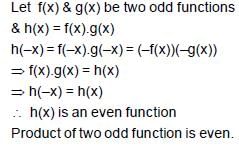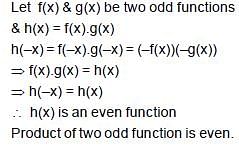JEE Exam > JEE Questions > Identify the incorrect statementa) sum of two...
Start Learning for Free
Identify the incorrect statement
- a)sum of two even functions is an even function
- b)product of two even functions is an even function
- c)sum of two odd functions is an odd function
- d)product of two odd functions is an odd function
Correct answer is option 'D'. Can you explain this answer?
| FREE This question is part of | Download PDF Attempt this Test |
Verified Answer
Identify the incorrect statementa) sum of two even functions is an eve...

Most Upvoted Answer
Identify the incorrect statementa) sum of two even functions is an eve...
Explanation:
To understand why option D is incorrect, let's review the properties of even and odd functions.
An even function is defined as a function that satisfies the property:
f(x) = f(-x) for all x in the domain of the function.
An odd function is defined as a function that satisfies the property:
f(x) = -f(-x) for all x in the domain of the function.
Now, let's analyze each statement:
a) Sum of two even functions is an even function:
Let's consider two even functions, f(x) and g(x).
For any x in the domain of the functions:
f(x) = f(-x) and g(x) = g(-x)
If we take the sum of these two functions, h(x) = f(x) + g(x), then we have:
h(-x) = f(-x) + g(-x) (using the definition of even functions)
= f(x) + g(x) (since f(x) = f(-x) and g(x) = g(-x))
Therefore, h(x) = h(-x), which means the sum of two even functions is an even function.
b) Product of two even functions is an even function:
Let's consider two even functions, f(x) and g(x).
For any x in the domain of the functions:
f(x) = f(-x) and g(x) = g(-x)
If we take the product of these two functions, h(x) = f(x) * g(x), then we have:
h(-x) = f(-x) * g(-x) (using the definition of even functions)
= f(x) * g(x) (since f(x) = f(-x) and g(x) = g(-x))
Therefore, h(x) = h(-x), which means the product of two even functions is an even function.
c) Sum of two odd functions is an odd function:
Let's consider two odd functions, f(x) and g(x).
For any x in the domain of the functions:
f(x) = -f(-x) and g(x) = -g(-x)
If we take the sum of these two functions, h(x) = f(x) + g(x), then we have:
h(-x) = f(-x) + g(-x) (using the definition of odd functions)
= -f(x) - g(x) (since f(x) = -f(-x) and g(x) = -g(-x))
Therefore, h(x) = -h(-x), which means the sum of two odd functions is an odd function.
d) Product of two odd functions is an odd function:
Let's consider two odd functions, f(x) and g(x).
For any x in the domain of the functions:
f(x) = -f(-x) and g(x) = -g(-x)
If we take the product of these two functions, h(x) = f(x) * g(x), then we have:
h(-x) = f(-x) * g(-x) (using the definition of odd functions)
= (-f(x)) * (-g(x)) (since f(x) = -f(-x) and g(x) = -g(-x
To understand why option D is incorrect, let's review the properties of even and odd functions.
An even function is defined as a function that satisfies the property:
f(x) = f(-x) for all x in the domain of the function.
An odd function is defined as a function that satisfies the property:
f(x) = -f(-x) for all x in the domain of the function.
Now, let's analyze each statement:
a) Sum of two even functions is an even function:
Let's consider two even functions, f(x) and g(x).
For any x in the domain of the functions:
f(x) = f(-x) and g(x) = g(-x)
If we take the sum of these two functions, h(x) = f(x) + g(x), then we have:
h(-x) = f(-x) + g(-x) (using the definition of even functions)
= f(x) + g(x) (since f(x) = f(-x) and g(x) = g(-x))
Therefore, h(x) = h(-x), which means the sum of two even functions is an even function.
b) Product of two even functions is an even function:
Let's consider two even functions, f(x) and g(x).
For any x in the domain of the functions:
f(x) = f(-x) and g(x) = g(-x)
If we take the product of these two functions, h(x) = f(x) * g(x), then we have:
h(-x) = f(-x) * g(-x) (using the definition of even functions)
= f(x) * g(x) (since f(x) = f(-x) and g(x) = g(-x))
Therefore, h(x) = h(-x), which means the product of two even functions is an even function.
c) Sum of two odd functions is an odd function:
Let's consider two odd functions, f(x) and g(x).
For any x in the domain of the functions:
f(x) = -f(-x) and g(x) = -g(-x)
If we take the sum of these two functions, h(x) = f(x) + g(x), then we have:
h(-x) = f(-x) + g(-x) (using the definition of odd functions)
= -f(x) - g(x) (since f(x) = -f(-x) and g(x) = -g(-x))
Therefore, h(x) = -h(-x), which means the sum of two odd functions is an odd function.
d) Product of two odd functions is an odd function:
Let's consider two odd functions, f(x) and g(x).
For any x in the domain of the functions:
f(x) = -f(-x) and g(x) = -g(-x)
If we take the product of these two functions, h(x) = f(x) * g(x), then we have:
h(-x) = f(-x) * g(-x) (using the definition of odd functions)
= (-f(x)) * (-g(x)) (since f(x) = -f(-x) and g(x) = -g(-x
Free Test
FREE
| Start Free Test |
Community Answer
Identify the incorrect statementa) sum of two even functions is an eve...

Attention JEE Students!
To make sure you are not studying endlessly, EduRev has designed JEE study material, with Structured Courses, Videos, & Test Series. Plus get personalized analysis, doubt solving and improvement plans to achieve a great score in JEE.

|
Explore Courses for JEE exam
|

|
Similar JEE Doubts
Identify the incorrect statementa) sum of two even functions is an even function b) product of two even functions is an even functionc) sum of two odd functions is an odd functiond) product of two odd functions is an odd functionCorrect answer is option 'D'. Can you explain this answer?
Question Description
Identify the incorrect statementa) sum of two even functions is an even function b) product of two even functions is an even functionc) sum of two odd functions is an odd functiond) product of two odd functions is an odd functionCorrect answer is option 'D'. Can you explain this answer? for JEE 2024 is part of JEE preparation. The Question and answers have been prepared according to the JEE exam syllabus. Information about Identify the incorrect statementa) sum of two even functions is an even function b) product of two even functions is an even functionc) sum of two odd functions is an odd functiond) product of two odd functions is an odd functionCorrect answer is option 'D'. Can you explain this answer? covers all topics & solutions for JEE 2024 Exam. Find important definitions, questions, meanings, examples, exercises and tests below for Identify the incorrect statementa) sum of two even functions is an even function b) product of two even functions is an even functionc) sum of two odd functions is an odd functiond) product of two odd functions is an odd functionCorrect answer is option 'D'. Can you explain this answer?.
Identify the incorrect statementa) sum of two even functions is an even function b) product of two even functions is an even functionc) sum of two odd functions is an odd functiond) product of two odd functions is an odd functionCorrect answer is option 'D'. Can you explain this answer? for JEE 2024 is part of JEE preparation. The Question and answers have been prepared according to the JEE exam syllabus. Information about Identify the incorrect statementa) sum of two even functions is an even function b) product of two even functions is an even functionc) sum of two odd functions is an odd functiond) product of two odd functions is an odd functionCorrect answer is option 'D'. Can you explain this answer? covers all topics & solutions for JEE 2024 Exam. Find important definitions, questions, meanings, examples, exercises and tests below for Identify the incorrect statementa) sum of two even functions is an even function b) product of two even functions is an even functionc) sum of two odd functions is an odd functiond) product of two odd functions is an odd functionCorrect answer is option 'D'. Can you explain this answer?.
Solutions for Identify the incorrect statementa) sum of two even functions is an even function b) product of two even functions is an even functionc) sum of two odd functions is an odd functiond) product of two odd functions is an odd functionCorrect answer is option 'D'. Can you explain this answer? in English & in Hindi are available as part of our courses for JEE.
Download more important topics, notes, lectures and mock test series for JEE Exam by signing up for free.
Here you can find the meaning of Identify the incorrect statementa) sum of two even functions is an even function b) product of two even functions is an even functionc) sum of two odd functions is an odd functiond) product of two odd functions is an odd functionCorrect answer is option 'D'. Can you explain this answer? defined & explained in the simplest way possible. Besides giving the explanation of
Identify the incorrect statementa) sum of two even functions is an even function b) product of two even functions is an even functionc) sum of two odd functions is an odd functiond) product of two odd functions is an odd functionCorrect answer is option 'D'. Can you explain this answer?, a detailed solution for Identify the incorrect statementa) sum of two even functions is an even function b) product of two even functions is an even functionc) sum of two odd functions is an odd functiond) product of two odd functions is an odd functionCorrect answer is option 'D'. Can you explain this answer? has been provided alongside types of Identify the incorrect statementa) sum of two even functions is an even function b) product of two even functions is an even functionc) sum of two odd functions is an odd functiond) product of two odd functions is an odd functionCorrect answer is option 'D'. Can you explain this answer? theory, EduRev gives you an
ample number of questions to practice Identify the incorrect statementa) sum of two even functions is an even function b) product of two even functions is an even functionc) sum of two odd functions is an odd functiond) product of two odd functions is an odd functionCorrect answer is option 'D'. Can you explain this answer? tests, examples and also practice JEE tests.

|
Explore Courses for JEE exam
|

|
Suggested Free Tests
Signup for Free!
Signup to see your scores go up within 7 days! Learn & Practice with 1000+ FREE Notes, Videos & Tests.
























